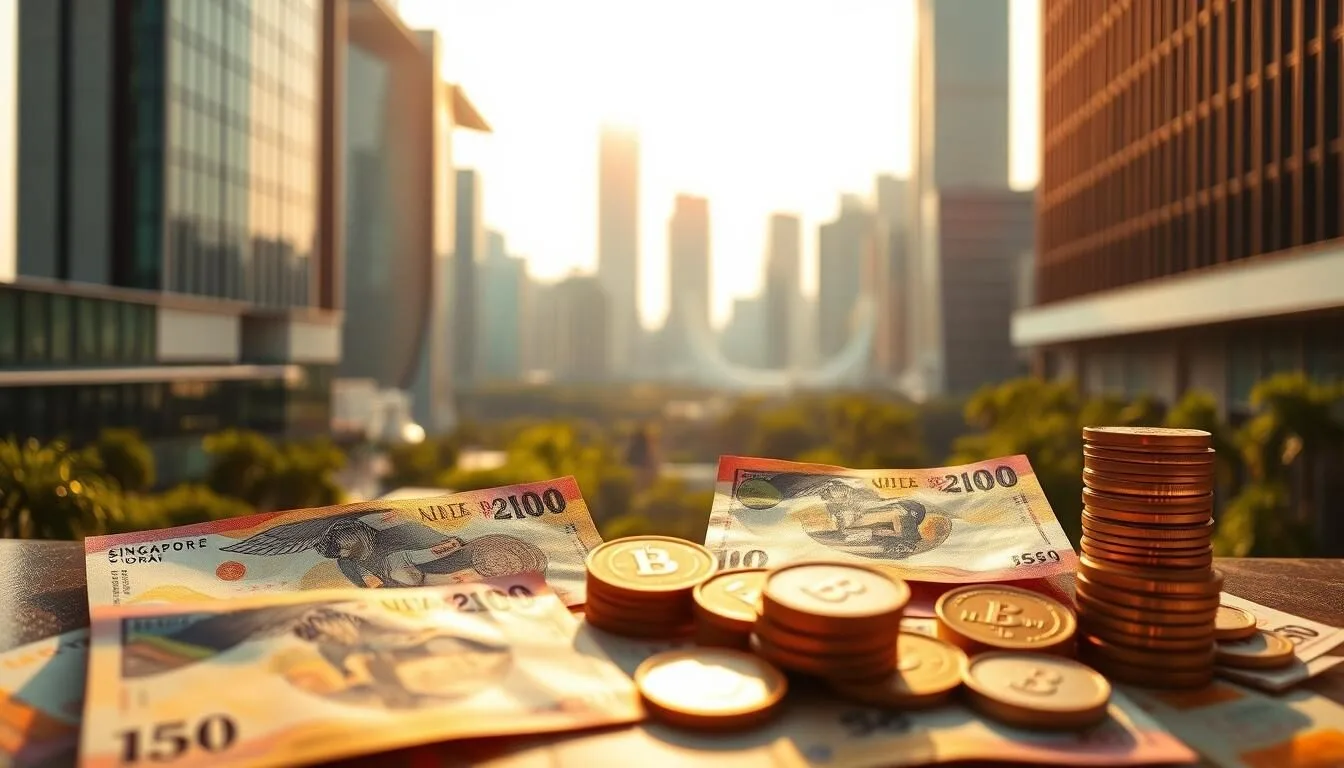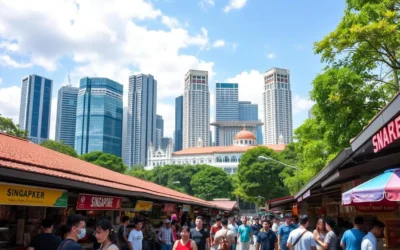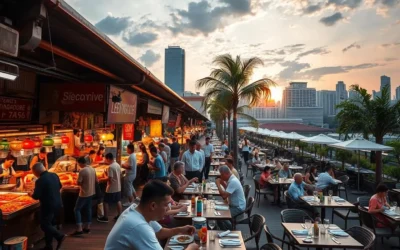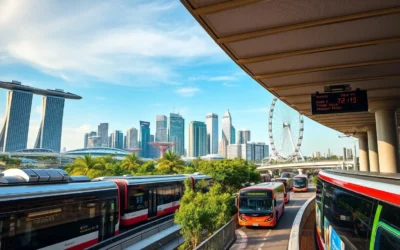✓ Accommodations ✓ Flights ✓ Rental Cars ✓ Tours & Activities
Did you know that Singapore attracts over 18 million tourists annually, making it one of the most visited cities in the world? With its blend of urban sophistication and rich cultural heritage, it’s a top travel destination. However, navigating currency and payment methods can be daunting for visitors.
Before embarking on your journey, understanding the local currency, the Singapore Dollar (SGD), and available payment options can make your trip smoother. With the right financial knowledge, you can avoid unnecessary fees and make the most of your travel budget.
Being prepared with the right information on SGD and payment methods will enhance your travel experience in this vibrant city-state. Let’s dive into the essentials of managing your money in Singapore.
Understanding Singapore’s Currency System
As you prepare for your trip to Singapore, familiarizing yourself with the local currency is a crucial step. Singapore’s currency system is designed to be efficient and easy to use, with various denominations available to cater to different needs.
The Singapore Dollar (SGD): Official Currency
The official currency of Singapore is the Singapore Dollar, abbreviated as SGD. It’s a robust and stable currency, widely accepted across the island. The Monetary Authority of Singapore is responsible for issuing and managing the SGD.
Denominations of Notes and Coins
Singapore’s currency comes in a range of denominations, making it convenient for transactions of various sizes. Coins are available in denominations of 5, 10, 20, and 50 cents, as well as 1 SGD. Banknotes are issued in denominations of 2, 5, 10, 50, 100, and 1,000 SGD.
- The 1-dollar coin is widely used for everyday transactions, while smaller coins are handy for parking and vending machines.
- Banknotes feature unique designs showcasing Singapore’s heritage and achievements, with security features like watermarks and security threads to prevent counterfeiting.
Here’s a summary of the available denominations:
| Denomination Type | Available Denominations |
|---|---|
| Coins | 5, 10, 20, 50 cents, 1 SGD |
| Banknotes | 2, 5, 10, 50, 100, 1,000 SGD |
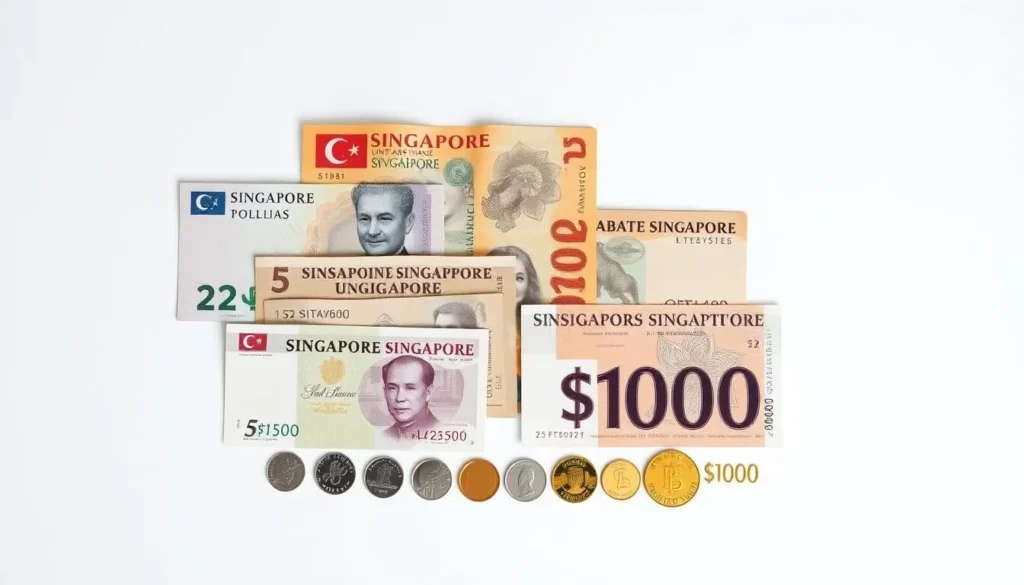
Familiarizing yourself with these denominations before your trip will help you navigate transactions with ease. Whether you’re dining at a hawker center or shopping at a local store, understanding the local currency will enhance your overall experience in Singapore.
Exchange Rates and Currency Conversion
To make the most out of your trip to Singapore, it’s essential to grasp the concept of exchange rates and currency conversion. Understanding these concepts can help you manage your transactions more effectively and enhance your overall travel experience.
Current Exchange Rates for Major Currencies
Staying updated with the current exchange rates for major currencies against the Singapore Dollar (SGD) is vital. You can find these rates on reliable currency conversion websites or financial news platforms. For instance, checking the current MYR/SGD rate can help you understand how much your Malaysian Ringgit is worth in SGD.
Understanding the Mid-Market Rate
The mid-market rate is the average exchange rate between two currencies, providing a benchmark for fair exchange. It’s beneficial to compare the rates offered by currency exchange services against the mid-market rate to ensure you’re getting a good deal. This comparison can help you save money on your transactions.
Currency Conversion Apps and Tools
Utilizing currency conversion apps and tools can greatly enhance your convenience while traveling. Apps like XE Currency, Wise, and Currency Converter allow you to check real-time exchange rates on the go. Some key benefits include:
- Real-time exchange rate updates
- Offline functionality after initial setup
- Built-in calculators for quick conversions
- Price alerts for favorable exchange rates
These tools enable you to make informed spending decisions and potentially save money by exchanging currency at favorable rates.

Where to Exchange Currency for Singapore Travel
To make the most of your Singapore trip, understanding where and how to exchange your currency is vital. Exchanging your money to the local currency, the Singapore Dollar (SGD), can be done before your trip or upon arrival.
Exchanging Currency Before Your Trip
Exchanging some money before your trip can be beneficial for initial expenses. You can compare exchange rates offered by different currency exchange services to get the best deal. Avoid exchanging money at airports, as they often offer poor rates due to their captive market. Instead, look for reputable currency exchange offices or banks in your home country.
Currency Exchange Options in Singapore
Upon arrival in Singapore, you have various options to exchange your currency. You can use currency exchange offices, banks, or even ATMs to withdraw SGD. Be cautious of “zero commission” claims, as these services might offer poor exchange rates to make up for it. It’s also wise to compare rates among different providers, as they can vary significantly.
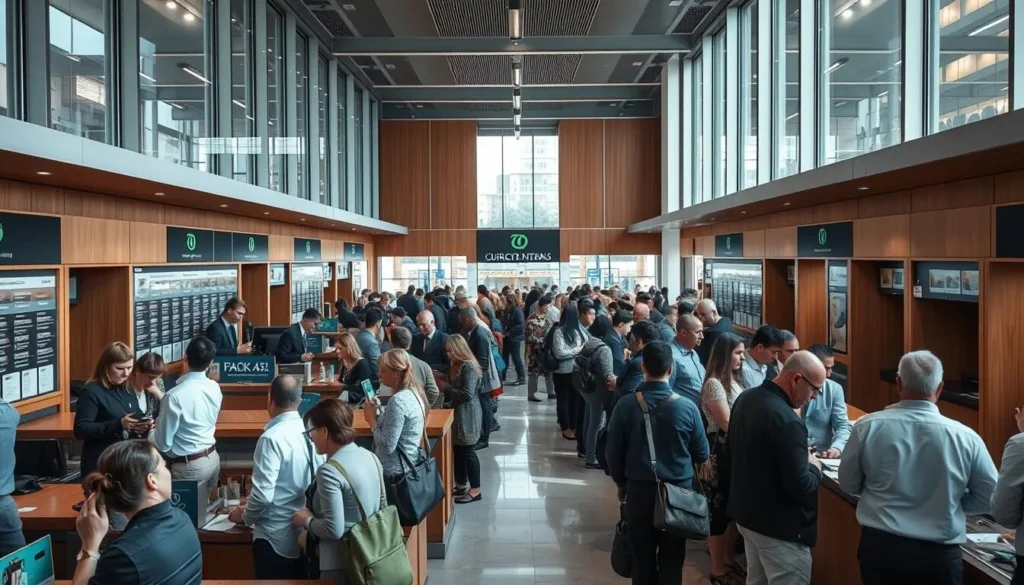
Avoiding Poor Exchange Rates and Hidden Fees
When exchanging currency, be aware of potential fees and poor rates. Some services charge additional fees for certain denominations or smaller amounts. Always clarify the total cost before proceeding with the transaction. Using online currency exchange comparison tools can help you identify the best places to exchange your money in Singapore.
| Exchange Method | Pros | Cons |
|---|---|---|
| Airport Exchange | Convenient | Poor exchange rates |
| Bank Exchange | Secure, competitive rates | May require account, some fees |
| Online Comparison Tools | Easy to compare rates, avoid hidden fees | May not execute the exchange directly |
Cash Payments in Singapore
While card payments are widely accepted in Singapore, there are still instances where cash is the preferred method of payment. You’ll need SGD, the local currency, for certain transactions, making it essential to understand where and how to access cash during your visit.
When Cash is Necessary: Hawker Centers and Local Markets
At hawker centers and local markets, cash is often the preferred payment method. These bustling food courts and marketplaces offer a wide range of affordable dining and shopping options, and while some vendors may accept card payments, many still rely on cash transactions. It’s a good idea to have some local currency on hand to enjoy the full range of offerings at these popular destinations.

ATM Locations and Withdrawal Fees
Singapore has an extensive network of ATMs located throughout the city, making it easy to access cash when you need it. Major banks like DBS, OCBC, and UOB have machines in most shopping malls and MRT stations. Be aware that your home bank may charge foreign transaction fees and ATM withdrawal fees when using your card in Singapore. Local banks typically charge a small fee (around S$3-5) for withdrawals using foreign cards. To minimize fees, consider making fewer, larger withdrawals rather than multiple small ones.
Card Payments in Singapore, Singapore: Ultimate Travelers Guide to Currencies & Payments
To make the most of your trip to Singapore, it’s vital to understand how to use your card wisely. Singapore is a predominantly cashless society, with card payments being widely accepted across the island.
Credit and Debit Card Acceptance
Major credit and debit cards, including Visa, Mastercard, and American Express, are widely accepted at most establishments in Singapore, including restaurants, shops, and hotels. You’ll find that even some hawker centers and local markets accept card payments, although cash is still preferred at some traditional stalls.
Foreign Transaction Fees and Dynamic Currency Conversion
When using your card abroad, be mindful of foreign transaction fees, which can add up quickly. Some banks and card issuers charge a fee on every transaction, while others may offer fee-free foreign transactions. Be cautious of dynamic currency conversion (DCC) options, which may offer convenience but often come with unfavorable exchange rates and additional fees.
Travel Cards and Prepaid Options
Prepaid travel cards are a convenient option for international travel, allowing you to load SGD and spend as you would with a debit card, avoiding foreign transaction fees. Multi-currency travel cards, such as those offered by Wise and Revolut, enable you to pre-load Singapore Dollars before your trip, locking in exchange rates and avoiding additional fees. These cards function like regular debit cards but typically offer better exchange rates and lower fees than standard bank cards.
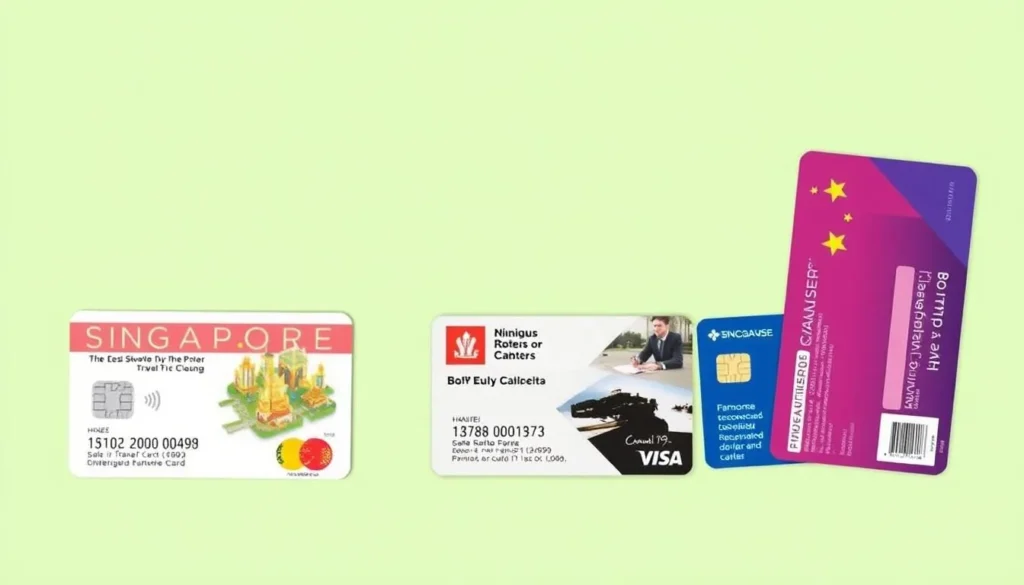
Digital and Mobile Payment Methods
As you explore Singapore, you’ll discover a city that has fully embraced digital and mobile payment methods, offering you a convenient and cashless experience. This shift towards digital payments has transformed the way you make transactions, making it easier to navigate the city.
Popular Mobile Payment Platforms
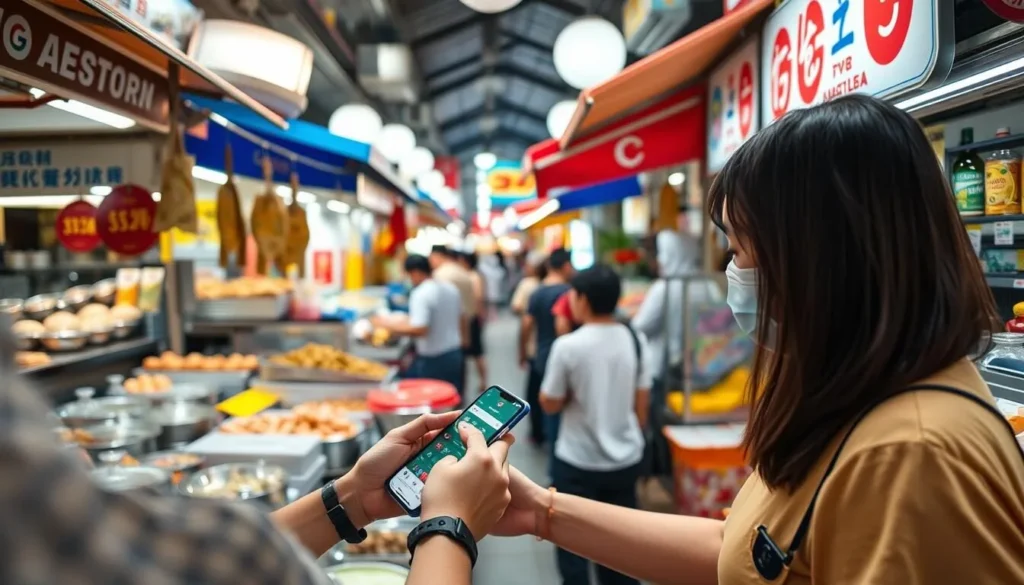
Singapore has adopted popular mobile payment platforms such as Google Pay, Apple Pay, and Samsung Pay. These platforms are widely accepted at various establishments, including hawker centers and shops, providing you with a seamless payment experience. The convenience of using these platforms means you can leave your cash behind and enjoy your time in Singapore without worrying about carrying SGD.
QR Code Payments and Contactless Options
QR code payments have become increasingly common in Singapore, particularly through the national SGQR system that unifies multiple payment platforms. Many hawker centers and small businesses display QR codes, allowing you to pay directly from your mobile banking or payment apps. Additionally, contactless payment options are widely available, with most terminals accepting tap-to-pay cards and NFC-enabled devices, enhancing the convenience of your payment experience.
The COVID-19 pandemic has accelerated the adoption of contactless payments in Singapore, making them available even at traditionally cash-only venues. As a result, you can enjoy a more streamlined experience when making payments, aligning with Singapore’s Smart Nation initiative to promote cashless payments throughout the city.
Money Transfer Services and Banking in Singapore
Understanding money transfer services and banking options is key to a smooth trip to Singapore. As a traveler, you’ll want to know your options for managing finances while abroad.
International Money Transfer Options
Some mobile banking apps, such as Paytm and ICICI Bank’s Money2World, facilitate easy remittances from India to Singapore. These apps generally offer competitive rates, making them a cost-effective solution for transferring funds, especially for tourists on extended stays or those studying or working in Singapore.
When transferring money, consider using services that offer low fees and competitive exchange rates. This can help you save money on your travel expenses.
Banking Services for Tourists
While opening a bank account as a short-term tourist in Singapore is challenging, many international banks offer global banking services that can be useful during your visit.
- Major international banks like HSBC, Citibank, and Standard Chartered have branches in Singapore, allowing their customers to access certain banking services while traveling.
- Some banks offer global ATM alliances that provide reduced or waived fees when using partner ATMs in Singapore, making it convenient to access your money with a debit or card.
- For extended stays, certain Singapore banks offer special accounts for foreigners, though these typically require documentation like employment passes or student visas.
Notifying your home bank about your travel plans can prevent your card from being flagged for suspicious activity when used in Singapore.
Conclusion
With its well-developed financial ecosystem, Singapore offers travelers a range of convenient payment options, from traditional cash to digital solutions. Understanding the Singapore Dollar (SGD) and planning your currency exchange strategy in advance will help you maximize your travel budget. While Singapore is increasingly cashless, keeping some physical currency on hand remains important for certain situations. By familiarizing yourself with Singapore’s currency system and payment landscape, you’ll be well-prepared to enjoy all that this remarkable city-state has to offer.
The above is subject to change.
Check back often to TRAVEL.COM for the latest travel tips and deals.
